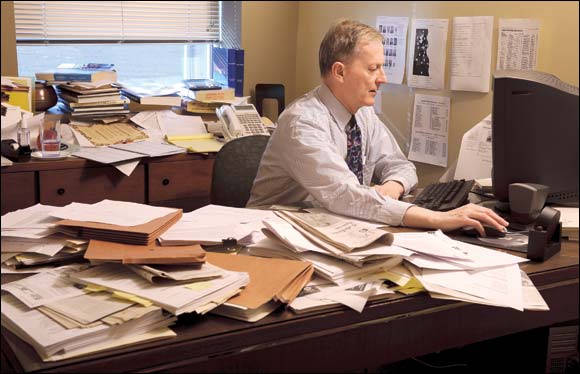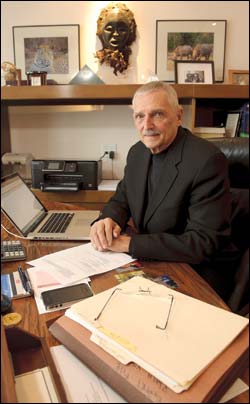Silent partners: Dwindling support squeezes state’s legal service groups
By: Jack Zemlicka, [email protected]//January 23, 2012//
Silent partners: Dwindling support squeezes state’s legal service groups
By: Jack Zemlicka, [email protected]//January 23, 2012//

State Sen. Glenn Grothman leaves no room for interpretation when summarizing the state’s stance on handouts for civil legal service.
“Nobody,” he said, “needs free lawyers.”
But “need” is a slippery term for lawyers wrestling with how, or if, they should fill the more than $5 million void the state carved out in its budget. That money was the state’s entire contribution to organizations that provide free legal assistance to Wisconsin’s poor.
State spending on civil legal services isn’t a priority, said Grothman, R-West Bend, and directing taxpayer money toward “more lawyers for the unemployed” is a mistake.
He said the state, especially during dire budgetary times, has a responsibility to spend money on essential programs — such as education, health care and law enforcement — that benefit the poor.
But with the state zeroed out and federal contributions diminishing, Wisconsin attorneys are the most stable remaining source of money for free legal service organizations.
Since 2005, every judge and active lawyer younger than 70 has paid a $50 annual assessment for the Public Interest Legal Services Fund. The Wisconsin Trust Account Foundation, which collects and distributes the assessments, has raised an average of $880,000 annually and dispersed it to as many as 14 free legal service providers.
There are about 17,500 legal professionals who contribute, said DeEtte Tomlinson, the foundation’s executive director.
“The $50,” she said, “is definitely the backbone of civil legal service funding right now.”
The legal community now must decide if that backbone needs reinforcement. Tom Cannon, executive director of the Legal Aid Society of Milwaukee Inc., said it does.
The society has received $296,200 in assessments since 2005, including a projected $100,000 in 2012.
“I think increasing the size of the assessment,” he said, “would be a step in the right direction.”
During the past 18 months, Legal Aid lost $500,000 in financial support with the expiration of limited-term state and federal grants and the state budget cut.
That forced Cannon to lay off six staff attorneys, he said, which in turn led to approximately 1,200 fewer cases taken by the organization.
“In raw human terms,” he said, “that’s what the loss of funding means for Legal Aid.”
Cullen Werwie, spokesman for Gov. Scott Walker, said there are other avenues organizations can pursue for money.
“Civil legal representation is private,” Werwie said, “and numerous groups like Legal Action of Wisconsin provide these services in conjunction with federal support.”
The state’s two largest legal service providers, Legal Action of Wisconsin Inc. and Wisconsin Judicare Inc., are the primary beneficiaries of federal grant money dispersed by Washington, D.C.-based Legal Services Corp.
But in fiscal year 2012, LSC cut grant money to the two organizations by 15 percent, or $684,000.
Absent consistency on the public side, attorneys bear the responsibility by default, said the Legal Aid Society’s Cannon. He acknowledged, though, that attorneys shouldn’t shoulder the burden alone.
“It is a public responsibility,” Cannon said. “But the courts and Legislature have defaulted on their responsibility to fund meaningful access to justice.”
He proposed increasing the attorney assessment to $200, arguing the change isn’t as drastic as it might sound.
“Say the average rate for lawyers who charge on an hourly basis is $200,” Cannon said. “Is an hour a year too much to ask of lawyers? I don’t think so.”
The original $50 assessment, proposed to the state Supreme Court in 2004, was designed to supplement the fluctuating pool of money generated by interest from lawyer trust accounts. Money from those accounts, which goes toward free legal services, also has diminished during the past three years from $1.7 million to $283,000.
The $50 assessment drew fierce opposition in 2004 and was opposed by the State Bar of Wisconsin’s Board of Governors.
After the court adopted the assessment, then-State Bar President Mike Guerin formed a task force to research and recommend how stakeholders in the civil justice system could finance legal services for poor people.
The study helped secure for the first time $1.9 million in state aid in the 2007-09 budget and then $5 million in the 2009-11 budget.
The Wisconsin Trust Account Foundation’s Tomlinson said the state aid wasn’t spent in a vacuum. According to the foundation, every dollar that went to civil legal services resulted in a reinvestment or recovery of $6.61 for clients.
But Wisconsin has returned to the ranks of states that do not give money to civil legal services. The others are Florida and Louisiana, which both cut state contributions in current budgets, and Idaho, which has never provided state money.
Taxpayers, especially low- to middle-income residents, Grothman said, shouldn’t foot the bill when some can’t even afford lawyers themselves.
“Why should a person making $25,000 a year and who probably is not eligible for these services have to pay taxes to provide a free lawyer to someone who is either not working or working for cash?” he said.
As an inactive lawyer, Grothman isn’t subject to the $50 assessment, but he said lawyers shouldn’t pay either. The organizations need to adjust to the reality of their budgets, he said, and not rely on the state or attorneys for additional money.
Any increase to the attorney assessment would be excessive, Guerin said, especially on the heels of the recession.
“To take an arbitrary fixed amount of money,” he said, “and tack it on to lawyers who are not making significant amounts of money from their law practice is unfair.”
That hasn’t prevented Minnesota and its lawyers from reaching a compromise. Minnesota attorneys found a permanent assessment for civil legal services relatively easy to digest because the state kicked in, too, said Minnesota State Bar President Brent Routman.
In March, after a two-year trial period, the Minnesota Supreme Court made permanent a $25 mandatory assessment.
Minnesota also allotted $11.2 million in its state budget for civil legal services, down from $13.5 million in the prior budget.
Legislators who were willing to spend state money on civil legal services prompted attorneys to contribute to the cause, Routman said.
“There was almost unanimous support for the assessment,” he said, “and not a lot of pushback because we have the state as a partner.”
That no longer is the case in Wisconsin, and attorney Dean Dietrich, president of the Wisconsin Trust Account Foundation board of directors, said the organization doesn’t plan to lobby for an increase to the $50 assessment.
“I have a real hard time reaching the conclusion that it’s solely a lawyer responsibility,” Dietrich said. “There tends to be this jump to point to lawyers as the ones who should be fixing this problem because they work in the legal field. I think it’s a societal issue.”
Making proper investments and setting priorities also are parts of a working society, Grothman said.
“We already give so much to poor people in the state that other people can’t afford,” he said. “I don’t know why we would give them free legal services that other people can’t afford.”
[polldaddy poll=”5869482″]
.
Mandatory pro bono gets another look

Dwindling financial aid for free legal services has prompted a return to the argument that time, rather than money, is the best solution.
Mandatory pro bono is a controversial concept Madison attorney Tom Basting said could be worth exploring to stem the tide of legal service providers cutting staff and taking fewer cases during the recession.
“A lot of people are hurting,” he said, “and they would hurt less if they had a competent lawyer helping them.”
Basting, a former State Bar of Wisconsin president, said bar leaders have discussed mandatory pro bono reporting in the past but never supported it.
He said a modest hourly requirement would ease the burden on legal service providers and increase the value of the $50 assessment Wisconsin lawyers pay to support civil legal services for the poor.
“If attorneys provided 20 hours per year of free legal service,” Basting said, “they could document it and show what they are doing to provide a better source for getting the work done.”
But bar leaders and the state Supreme Court haven’t been receptive to other proposals that would have required less.
The Board of Governors opposed a 2003 proposal that would have required lawyers report their pro bono hours for a four-year period on annual dues statements.
In 2006, the Wisconsin Supreme Court rejected a similar proposal.
Wisconsin is among 32 states that don’t have a pro bono reporting requirement.
Tom Cannon, executive director of the Legal Aid Society of Milwaukee, said he is in favor of considering as many solutions as possible. But he said mandatory pro bono isn’t the best option because it could lead to lawyers giving legal advice in unfamiliar areas of the law.
“There are too many lawyers in private practice not conversant with the legal issues facing the poor,” Cannon said.
That could lead to new expenses, he said, for training and supervising lawyers unfamiliar with the core legal services provided by organizations such as Legal Aid. Those services require familiarity with topics such as landlord-tenant disputes, foreclosures and social security disability.
“It’s more efficient,” Cannon said, “to raise money and give it to a competent legal services program that can handle so many more cases, more efficiently.”
No state has adopted a mandatory minimum for pro bono hours, but seven have mandatory annual reporting.
Illinois mandated pro bono reporting in 2006, and Kelly Tautges, director of pro bono for the Chicago Bar Foundation, said the change probably encouraged more lawyers to provide free legal services.
“The first question on the registration is: Have you performed pro bono services?” Tautges said. “I think it’s human nature that attorneys don’t want to put down zero if they don’t have to.”
Still, Basting said, pitching some form of a mandatory pro bono in the current financial climate is more viable than increasing the assessment imposed on lawyers to support civil legal services.
“It’s a legitimate alternative,” he said, “as opposed to just throwing more money and doubling the assessment to $100.”
— Jack Zemlicka
Legal News
- Wisconsin attorney loses law license, ordered to pay $16K fine
- Former Wisconsin police officer charged with 5 bestiality felony counts
- Judge reject’s Trump’s bid for a new trial in $83.3 million E. Jean Carroll defamation case
- Dozens of deaths reveal risks of injecting sedatives into people restrained by police
- The Latest: Supreme Court arguments conclude in Trump immunity case
- Net neutrality restored as FCC votes to regulate internet providers
- Wisconsin Attorney General asks Congress to expand reproductive health services
- Attorney General Kaul releases update at three-year anniversary of clergy and faith leader abuse initiative
- State Bar leaders remain deeply divided over special purpose trust
- Former Wisconsin college chancellor fired over porn career is fighting to keep his faculty post
- Pecker says he pledged to be Trump campaign’s ‘eyes and ears’ during 2016 race
- A conservative quest to limit diversity programs gains momentum in states
WLJ People
- Power 30 Personal Injury Attorneys – Russell Nicolet
- Power 30 Personal Injury Attorneys – Benjamin Nicolet
- Power 30 Personal Injury Attorneys – Dustin T. Woehl
- Power 30 Personal Injury Attorneys – Katherine Metzger
- Power 30 Personal Injury Attorneys – Joseph Ryan
- Power 30 Personal Injury Attorneys – James M. Ryan
- Power 30 Personal Injury Attorneys – Dana Wachs
- Power 30 Personal Injury Attorneys – Mark L. Thomsen
- Power 30 Personal Injury Attorneys – Matthew Lein
- Power 30 Personal Injury Attorneys – Jeffrey A. Pitman
- Power 30 Personal Injury Attorneys – William Pemberton
- Power 30 Personal Injury Attorneys – Howard S. Sicula











